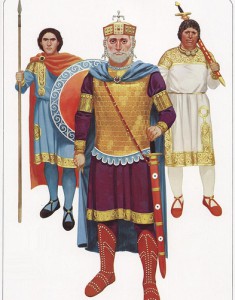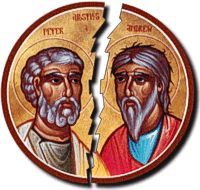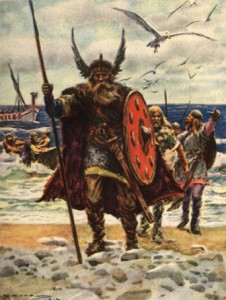 Ryan asks what the two “halves” of the Roman Empire (German and Byzantine)- thought of each other. The word ‘dysfunctional’ about sums it up. Their relationship over the six and a half centuries of their co-existence was perpetually stormy: two empires (neither of which controlled Rome) arguing over who was really ‘Roman’. Generally speaking, the Byzantines considered Charlemagne and his successors to be jumped-up barbarians, uncouth boors pretending to be something that they were clearly not. Constantinople tried its best to pretend that the Holy Roman Empire didn’t exist, and when power politics made that impossible, they reluctantly admitted that the German monarch was an ‘emperor’ (though not a Roman one).
Ryan asks what the two “halves” of the Roman Empire (German and Byzantine)- thought of each other. The word ‘dysfunctional’ about sums it up. Their relationship over the six and a half centuries of their co-existence was perpetually stormy: two empires (neither of which controlled Rome) arguing over who was really ‘Roman’. Generally speaking, the Byzantines considered Charlemagne and his successors to be jumped-up barbarians, uncouth boors pretending to be something that they were clearly not. Constantinople tried its best to pretend that the Holy Roman Empire didn’t exist, and when power politics made that impossible, they reluctantly admitted that the German monarch was an ‘emperor’ (though not a Roman one).
The Franks for their part, acted like a younger sibling. They viewed the ‘Greeks’ as soft, effeminate, easterners, unworthy of the name ‘Roman’, but were at the same time a bit insecure and jealous of the older empire’s greater legitimacy. They at first stopped calling themselves Roman to appease Constantinople, and even when they resumed the claim, German monarchs would occasionally cross the border in southern Italy (where the two empires touched) to seek formal recognition of their titles, and ask for marriage alliances. This finally paid off in 972 when the Byzantine princess Theophano married the German emperor Otto II. Their son- Otto III- was therefore a union of both crowns and was probably the best hope for a reunification of the old Roman Empire. Unfortunately, however, he died of a fever at age 21 and the empires resumed their antagonistic stances.
There was one more brief moment of cooperation. During the reign of the pro-western Manuel Comnenus, the German emperor Conrad III led the (disastrous) 2nd Crusade through Constantinople. The two became close friends, with Manuel personally nursing his brother-monarch back to health after an injury suffered during the campaign. But when they exited the scene, relations quickly soured. The terrifying Frederick Barbarossa (Conrad’s successor) threatened to sack Constantinople and throw its emperor into prison, and several of his successors invaded Byzantine territory.
The Holy Roman Empire never succeeded in getting Constantinople to recognize it as an equal, but it did outlast it. Though its power largely collapsed in the 13th century, the empire limped along until the 19th, finally being swept aside during the Napoleonic Wars. Before it disappeared, however, it had one last parting shot at its (by now) long dead adversary. In 1557, the German humanist Hieronymus Wolf published a history of the medieval Greek world. Not wanting to refer to the impostors in Constantinople as ‘Roman’ (since the real Roman Empire was in Germany) he coined a new term for them.
“Byzantine”
 Jack asks how much influence the Pope had in Byzantium before the Great Schism and how that crisis affected the Empire.
Jack asks how much influence the Pope had in Byzantium before the Great Schism and how that crisis affected the Empire.
Constantinople’s attitude towards Rome was always a complicated one. On the one hand, the bishop of Rome had a uniquely respected place in the early church. Peter, who had been entrusted with the ‘keys to the kingdom of heaven’ had founded its church, and as such it had far more prestige than the relatively late church of Constantinople. The Pope was the ‘first among equals’, due a special reverence and respect. On the other hand, however, Constantinople was the residence of the emperor- God’s regent on earth who looked after the physical well-being of the faithful in the same way the church looked after its soul. They resented the increasingly authoritarian claims of the Roman church as it moved from ‘first among equals’ to simply ‘first’. The Orthodox view was that each of the five major bishops of the Church (Rome, Antioch, Jerusalem, Alexandria, and Constantinople) had an equal voice- Rome was in effect an elder statesman not a dictator.
As the East and West went their separate ways politically, the Pope became a useful tool for the Emperor to use if he disagreed with his Patriarch. In the case of Leo the Wise, for instance, when his church rejected his bid for a fourth marriage, he referred the matter to the Pope, knowing that the pontiff would eagerly grant him a marriage in exchange for publicly ‘overruling’ the Patriarch. This was a political gambit- nothing more. But it does show that the Pope’s opinion still mattered- the ‘senior’ bishop of Christendom had weighed in and- over the Patriarch’s objection- Leo got his 4th marriage.
As for the Great Schism, 1054 is a nice, clean date for historians, but is relatively meaningless. As Sir Steven Runciman wrote ‘a schism only exists when a majority of individuals believe it does.’ Clearly this wasn’t the case in the 11th century. A hundred years after the ‘Schism’ the emperor Manuel Comnenus wrote to the Pope, offering to act as the ‘sword arm of the Church’ in the reconquest of Italy from the Normans. The Pope accepted- hardly the actions of people who considered the other side heretical. What really put the nail in the coffin of Church unity was the 4th Crusade. After that tragedy, there was no real possibility of reunion. As the Byzantines famously put it- ‘better the Sultan’s turban than the Pope’s mitre.’ While the Orthodox church maintains even today that they will welcome the Pope back into his favored position if he admits his errors, practically speaking all papal influence on Byzantium ceased in 1204.
 Listener Bruce from Ohio asked about the background of the Normans. Can they really be considered Vikings? The answer- as is so often the case with history- is yes and no. The Normans were indeed descended from Scandinavian stock and the term ‘Norman’ comes from ‘northmen’ which was the French term for the Vikings. Rollo the first “Duke” led a collection of Norwegian and Danish raiders who forced the Frankish king Charles the Simple to grant them land. These Vikings, however, were always a minority in Normandy, surrounded and vastly outnumbered by the French population. Rollo, who knew he had to adapt to survive, set the tone by taking a Frankish wife, adopting the French language and religion, and encouraging his men to do likewise. Within a generation Norse names died out, and the Dukes were busy trying to prove that they were respectable members of the Frankish power structure. They maintained close ties with their Scandinavian cousins- even agreeing to sell Viking plunder in their markets- but made it a point to distinguish themselves from the ‘sea wolves’.
Listener Bruce from Ohio asked about the background of the Normans. Can they really be considered Vikings? The answer- as is so often the case with history- is yes and no. The Normans were indeed descended from Scandinavian stock and the term ‘Norman’ comes from ‘northmen’ which was the French term for the Vikings. Rollo the first “Duke” led a collection of Norwegian and Danish raiders who forced the Frankish king Charles the Simple to grant them land. These Vikings, however, were always a minority in Normandy, surrounded and vastly outnumbered by the French population. Rollo, who knew he had to adapt to survive, set the tone by taking a Frankish wife, adopting the French language and religion, and encouraging his men to do likewise. Within a generation Norse names died out, and the Dukes were busy trying to prove that they were respectable members of the Frankish power structure. They maintained close ties with their Scandinavian cousins- even agreeing to sell Viking plunder in their markets- but made it a point to distinguish themselves from the ‘sea wolves’.
So what exactly were they? As frustrating as it is we have to fall back on how they saw themselves. Their court historians never tired of pointing it out. They were not Vikings or French but something far better. They were Normans.
 Ryan asks what the two “halves” of the Roman Empire (German and Byzantine)- thought of each other. The word ‘dysfunctional’ about sums it up. Their relationship over the six and a half centuries of their co-existence was perpetually stormy: two empires (neither of which controlled Rome) arguing over who was really ‘Roman’. Generally speaking, the Byzantines considered Charlemagne and his successors to be jumped-up barbarians, uncouth boors pretending to be something that they were clearly not. Constantinople tried its best to pretend that the Holy Roman Empire didn’t exist, and when power politics made that impossible, they reluctantly admitted that the German monarch was an ‘emperor’ (though not a Roman one).
Ryan asks what the two “halves” of the Roman Empire (German and Byzantine)- thought of each other. The word ‘dysfunctional’ about sums it up. Their relationship over the six and a half centuries of their co-existence was perpetually stormy: two empires (neither of which controlled Rome) arguing over who was really ‘Roman’. Generally speaking, the Byzantines considered Charlemagne and his successors to be jumped-up barbarians, uncouth boors pretending to be something that they were clearly not. Constantinople tried its best to pretend that the Holy Roman Empire didn’t exist, and when power politics made that impossible, they reluctantly admitted that the German monarch was an ‘emperor’ (though not a Roman one).
